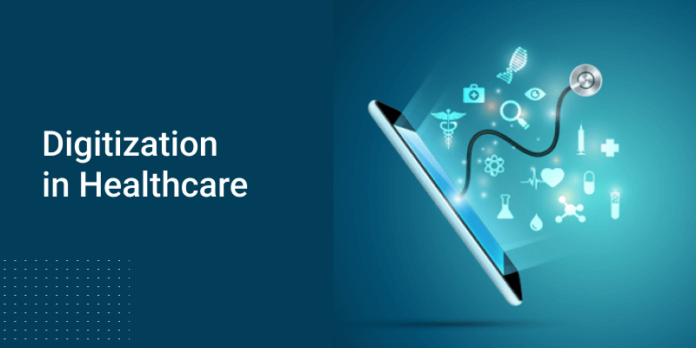Digitization has touched every sector, and healthcare is in inclusion. It is a new tech healthcare solution that allows patients and doctors to connect and diagnose in real time. This sector has seen a dynamic change with the acceleration of healthcare app development solutions. Besides, such a digital adaptation of healthcare has reshaped how patients consume and share medical information.
As a result of digitizing healthcare, medical providers are having more streamlined processes and a more comprehensive range of options to diagnose, prevent and cure diseases. If we see the patient’s side, they can make more informed decisions about health and treatment options.
Such a digital shift comes with various benefits, challenges, and trends that are worth knowing. Hence, go deep down in this blog article to learn more about the digitization of healthcare.
Why Is Digitizing Healthcare Has Become So Crucial?
The increase in internet usage, more data access and the latest advent of technologies are helping and playing a core part indigitizing healthcare. It has helped healthcare providers and patients access the records and information in real time.
Mainly, the healthcare industry has been upscaled to 8 million and above. It is the main reason healthcare startups excel and grow tremendously in this market. Now, after knowing its significance, let’s look through the benefits of digitization in the healthcare industry.
Benefits of Healthcare Digitization
Digitization in healthcare has brought exponential benefits and growth to the sector. It benefits doctors and patients at different stages in the patient’s journey. Let’s know how digitization in healthcare is super advantageous:-
1. Accurate Diagnosis
With the aid of healthcare digital transformation solution patients can receive correct diagnosis. The proper use of healthcare technologies enables healthcare professionals to diagnose the patient’s condition remotely. Besides, the patient’s information get’s displayed, such as their medical treatment history and list of medications that can be easily stored, accessed and shared between the healthcare professionals in real-time. It will help give a more detailed and accurate profile for the patient that can help improve the accuracy of diagnosis and facilitate the clinical decisions.
2. Improvement In the Healthcare Service Quality
The gradual increase in the digitizing healthcare platforms makes it simpler for patients to access the medical data and healthcare facilities available in real time. Due to its monitoring and tracking of conditions remotely, it promotes a greater emphasis on self-care and helps patients to enable their treatments.
Through such digital health platforms, healthcare providers are enabling a wide range of applications remote therapeutics for acute and chronic diseases. They can easily detect patients’ earlier treatments, which allows quicker response to emergencies.
3. Healthcare is Accessible
Traveling to the city to eventually receive medical care can be challenging for patients living in rural areas. And especially the elderly who might have mobility issues.
At this time, the healthcare app makes it a smoother process and helps connect to even the remotest areas. Patients who have once been accustomed to the challenges can quickly get medical facilities through digitization.
4. Reduction In the Cost of Healthcare
Due to the higher medical costs, mainly over half of the population is facing problems. If we take the help of the latest technology like Telemedicine, it can be reduced and access health conditions remotely.
It allows patients, especially in low- to middle-income families, to get both primary and acute services at affordable prices through digitizing healthcare.
5. Gradual Increase In the Efficiency
There has always been a need for medical services is crucial, and that proves somewhere the burden on the existing healthcare providers. Here, in a digitized manner, the service providers get full access to the patient’s medical history, improving efficiency as the outcomes and treatments can be better provided. The patients also get reduced strain on the providers and can increase treatment efficiency.
Current Trends In the Digitized Healthcare
As the digital health solution continues to evolve, understanding the healthcare trends becomes crucial. It will also help in finding the broader ways for healthcare needs and challenges:-
1. On-demand Healthcare
It mainly refers to using real-time healthcare services via various online platforms. The platform offers functionalities like booking appointments, receiving test results and even remote consultations. As the industry is experiencing a boom, the demand for such healthcare services in real-time is mainly expected to rise in future.
2. Artificial Intelligence(AI)
With ChatGPT, AI has already initiated its footsteps in the market. And during this decade, AI-powered technologies like Chatbots, Virtual health assistants and even robot nurses can be seen.
Such digitizing healthcarewill provide tremendous value to healthcare providers in fields such as genomics, precision medicine, drug research and medical imaging, which will be lucrative opportunity sectors in the future.
3. Big Data & Predictive Analytics
Big data merely collects information from various online resources such as social media and e-commerce platforms that can identify patterns of the particular subject. In the healthcare industry, such technology can be used to reduce the rate of medical errors such as the prescription of drugs, excludes workforce planning and reduces waiting time and also decreases the number of repeat visits to emergency rooms for preventive care.
As technology evolves, big data can evenly help predict sickness and disease that may pose significant challenges in the future. It allows healthcare professionals and patients to take preventive measures.
4. Blockchain Technology
Blockchain is a secure digital ledger that mainly allows people to exchange information without a need for a third party. In healthcare, this technology can be used to transfer the patient’s medical records between the service providers, to prevent data breaches and reduce costs.
The app for blockchain technology in healthcare is expected to excel in the upcoming years. And it is a future tech and will be a part of critical trends in healthcare.
5. Virtual Reality(VR)
Though Virtual Reality is mainly associated with gaming, this technology has brought more value to the healthcare industry. This digitizing healthcaretrend can be used to treat pain, stroke and various other health-related issues such as anxiety.
Healthcare professionals also use it to practice their medical and surgical skills. The research is being continued in this technology; VR can be used for various treatments.
Moreover, apart from these key trends, some challenges might be faced whileadapting to digitization in healthcare.
Challenges of The Healthcare Digitization
Technological advancements in the healthcare sector, despite being digital health technology, such products can often face challenges with the launch and adaptation:-
1. Regulations & Legislations
The critical challenges of Medical technology(MedTech) are the complex and fragmented regulatory and legislative landscape. They need to be more robust to address the unique features of such solutions that impede the creation, launch and adoption of many innovative products.
2. Reimbursement
Even after launching such digitized healthcare solutions, they need more clarity and consistent reimbursement pathways. It is especially apparent in the public healthcare systems.
For patients, such difficulties with better reimbursement can limit the adoption of the technology by reducing access to the patient’s data. Thus, making it challenging for innovators to prove the value of such technologies against the investment required.
3. Interoperability
Due to the lack of harmonized regulations and differences in the storage and coding, data interoperability has been an ongoing challenge for many solution providers and healthcare professionals, even after the adoption of technology.
Plenty of data still needs to be used, and healthcare providers cannot leverage such information to improve the standard of healthcare for patients.
4. Digital Literacy
The major challenge can be low digital literacy among patients and healthcare professionals. There are high chances that product adoption can be reduced as many may experience vivid challenges while learning.
Even after adopting these technologies, many may not reap the full benefits as they struggle with the usage and functionality of digitizing healthcare.
5. Data Security & Privacy
In digital health data, security and privacy are the significant challenges to overcome. A data breach here might be a loss of the patient’s personal information, trust,and scams.
For that reason, the loopholes in the digital healthcare system must be addressed, and users can be educated with the proper preventive measures to safeguard such data. A consistent policy framework is essential to be adopted for the protection of data privacy and security.
Wrapping_ It Up
Digitizing healthcare has its own benefits and challenges though the change is still in the process. Some key trends you can follow are mentioned in this blog article, which can help in excelling the business and reach a more patient base.
Though it might be intriguing to see these many challenges. Despite that fact, digitization in healthcare has brought convenience and automation in the markets and can help in broad expansion of this sector in future.








